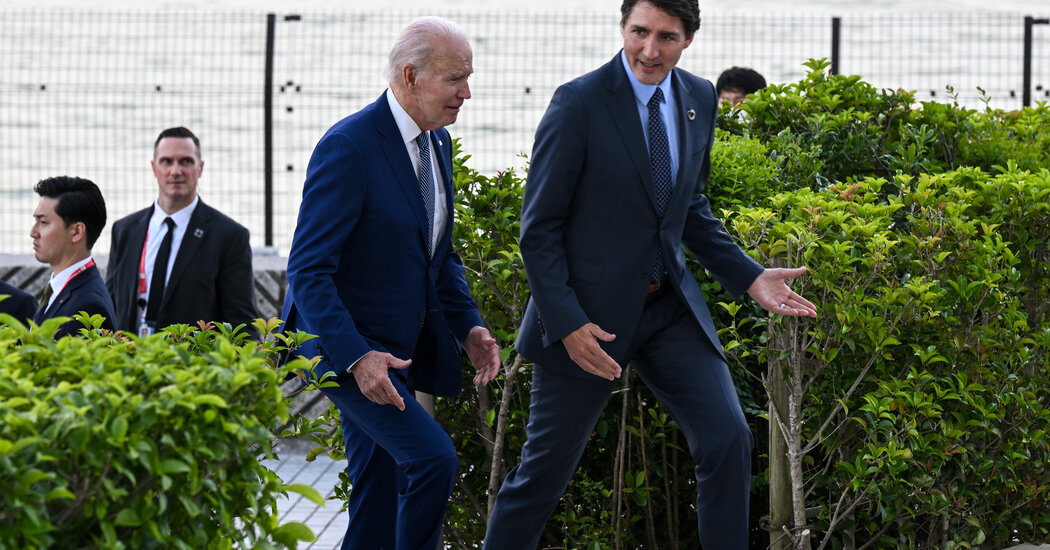[ad_1]
When Prime Minister Justin Trudeau and President Biden next meet, they will have something to commiserate over: their dismal standings in polls.
For months now, Mr. Trudeau’s Liberal Party has been rapidly sinking in public opinion surveys, while more recent polls suggest that the Conservatives under Pierre Poilievre would win any election held now.
Similarly, new polls by The New York Times and Siena College have found that Mr. Biden is trailing Donald J. Trump in five of the six most important battleground states.
[Read: Trump Leads in 5 Critical States as Voters Blast Biden, Times/Siena Poll Finds]
[The detailed Times/Siena Poll data]
Comparing the political situations in Canada and the United States is a fraught business because of a variety of differences between the countries and their political systems. And, of course, Americans don’t vote for another year, and Canada’s next federal election is likely to be two years off.
But disaffected voters in both countries share a major concern: inflation, and the economy in general.
“There’s ample evidence that inflation is destructive to an incumbent government’s performance and how people feel about it,” David Coletto, the chairman and chief executive of Abacus Data, told me.
Mr. Coletto’s latest poll found that 39 percent of committed voters would vote for the Conservatives and 26 percent would vote Liberal, while the New Democrats were backed by 18 percent of those voters. (In Quebec, the Bloc Québécois was supported by 34 percent of committed voters.)
That is a long way down for Mr. Trudeau from his early days as prime minister, when his leadership approval ratings hit an eye-watering 73 percent in one poll. The current Abacus poll found that 53 percent of respondents had a negative view of Mr. Trudeau, with just 29 percent holding a favorable view.
Many factors, Mr. Coletto said, contribute to that dissatisfaction, but inflation, higher interest rates, housing costs and a general feeling of ennui about the economy are at the top.
Voters polled in the Times/Siena survey, by a 59 percent to 37 percent margin — the largest gap relating to any issue in the survey — said they had more trust in Mr. Trump than Mr. Biden on the economy.
Some of the criticism of Mr. Trudeau’s economic record, Mr. Coletto said, is based on perceptions that don’t match reality. In an earlier Abacus survey, Mr. Coletto found that most Canadians incorrectly believed that inflation was higher in Canada than in other countries. International Monetary Fund statistics for October show that Canada’s 3.6 percent rate is well below Germany’s 6.3 percent or France’s 5.6. Similarly, Mr. Biden gets little or no credit for the significant job creation under his watch.
“But it doesn’t calm nerves to say, ‘Folks, things are good here relatively speaking,’ when relative to where they were five years ago, things are not better,” Mr. Coletto said. “And that’s how people evaluate their situation because people don’t live in those other countries where inflation still remains very high.”
The other big factor for Mr. Trudeau, Mr. Coletto said, is simply that many voters are tiring of a leader like him, who has been around since 2015 and led his party through three successful elections. Mr. Biden may only be in his first term as president, but he has been a national political figure since first being elected to the Senate 50 years ago.
Mr. Biden’s age, 80, is also an issue. In the Times/Siena survey, 71 percent of respondents said he was “too old” to be effective as president. Only 39 percent thought that of Mr. Trump, who is 77.
“Inflation kills governments plus time kills governments,” Mr. Coletto said.
While the standing of Mr. Trudeau’s Liberal government has never before dipped this low in the polls, there have been other periods when his popularity has ebbed, only to recover. And relatively few Liberals have publicly suggested it might be time for the prime minister to step aside despite his repeated vow to fight the next election. Similarly, calls for Mr. Biden to retire from prominent Democrats remain limited.
“Is the prime minister going to stay, or go?” Mr. Coletto said. “I have no idea. But where his leadership is today is a very different place than it was five months ago.”
-
The latest, and youngest, residents of the Chartwell Colonel Belcher Retirement Residence in Calgary are the members of New Zealand’s curling team, who have come to Canada to hone their skills.
-
The trial of David DePape, who the police say broke into Nancy Pelosi’s San Francisco home and bludgeoned her husband in 2022, when she was still speaker of the House, is underway. Mr. DePape, a Canadian, was living illegally in the United States at the time. His lawyer is not contesting prosecutors’ evidence.
-
Following its bankruptcy filing, WeWork closed four Canadian locations. A Canadian real estate investor told The New York Times that the bankruptcy signified the end of projections that flexible office space would one day account for a significant portion of commercial office rentals.
-
Marcel Dzama, the Winnipeg-born artist, spoke with Julia Halperin about his collection of 250 handmade masks.
-
Kathleen Mansfield, a Toronto pharmacist, is among a group of people who told The Times Magazine about why they wanted space to be their final resting place.
-
A first-class dinner menu from the Titanic dated April 11, 1912, which was found in a photo album from the 1960s that once belonged to a community historian in Dominion, Nova Scotia, is expected to sell for upward of $86,000 at auction.
A native of Windsor, Ontario, Ian Austen was educated in Toronto, lives in Ottawa and has reported about Canada for The New York Times for the past 16 years. Follow him on Twitter at @ianrausten.
How are we doing?
We’re eager to have your thoughts about this newsletter and events in Canada in general. Please send them to nytcanada@nytimes.com.
Like this email?
Forward it to your friends, and let them know they can sign up here.
[ad_2]
Source link




